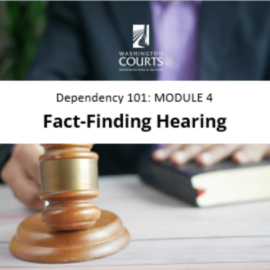Carissa Greenberg[1]
2022[i]
Introduction
There are many Washington statutes that affect children involved in the child welfare system both directly and indirectly. These statutes include titles on mental health, state Medicaid, services for persons with developmental disabilities, education, and juvenile dependency and termination of parental rights. Select statutes are discussed below.
RCW Title 13
Title 13 of the Revised Code of Washington contains laws affecting juveniles and juvenile courts. The chapters which most often affect children involved in the child welfare system are the following:
- RCW 13.04 is the Basic Juvenile Court Act. It contains some definitions used throughout Title 13, including the definition of “juvenile court” and describes juvenile court jurisdiction, administration, and other relevant features. It also contains some general provisions regarding juvenile offenders.
- RCW 13.32A is the Family Reconciliation Act (also known as the Becca Bill). This chapter governs At-Risk Youth (ARY) and Child in Need of Services (CHINS) proceedings.
- RCW 13.34 is the dependency and involuntary termination of parental rights statute. It governs dependency actions from shelter care through adoption or guardianship. Termination of Parental Rights are covered in other chapters of this benchbook in greater detail.
- RCW 13.36 governs guardianships flowing from dependency cases. These guardianships are a permanent plan under the dependency statute, and the underlying dependency case is dismissed once the RCW 13.36 guardianship is entered. Previously, state law recognized “dependency guardianships” (as opposed to RCW 13.36 guardianships) as a permanent plan. Dependency guardianships established under RCW 13.34 by June 10, 2010 remain in effect but may be converted to a 13.36 RCW guardianship.
- RCW 13.38 is the Washington State Indian Child Welfare Act (WICWA). Passed in 2011, WICWA codifies the main provisions of the federal Indian Child Welfare Act (ICWA). It clarifies how the federal law is to be implemented and even expanded. For example, WICWA includes a definition of the “best interests of the Indian child” and recognizes tribal decisions on membership as conclusive.[2]
- RCW 13.40 is the Juvenile Justice Act and governs offender actions against juveniles.
- RCW 13.50 governs the disclosure of confidential child and family records created and maintained by juvenile justice or care agencies, including the Department of Children, Youth, and Families (DCYF) and the juvenile court. (There are a number of other statutes that require confidentiality for certain kinds of records, such as those relating to medical or drug/alcohol treatment. Consequently, the court should be aware that RCW 13.50 is not comprehensive with respect to child and family records.)
- RCW 13.64 is the Emancipation of Minors statute.
RCW Title 9A
Certain laws within the criminal code, specifically within Title 9A, relate to juvenile court proceedings. They include the following:
- RCW 9A.16.100 sets the parameters of the “reasonable force” defense to a crime of assault against a child.
- RCW 9A.44.120 is the child hearsay statute applicable to sexual abuse cases in criminal proceedings and dependency/termination of parental rights proceedings.
- RCW 9A.64.020 is the incest statute.
- RCW 9A.64.030 prohibits buying and selling children.
RCW 11.130
RCW 11.130 contains the Uniform Guardianship, Conservatorship, and Other Protective Arrangements Act. This chapter replaced RCW 11.88 governing guardianship of incapacitated persons and RCW 26.10 governing nonparental custody proceedings, which are now repealed. RCW 11.130.185-.260 addresses guardianship of minors. These guardianships are different than RCW 13.36 guardianships.
RCW Title 26
Title 26 is entitled “Domestic Relations” and contains Washington’s family law statutes. Many of these statutes require that pattern forms be used. These forms (and instructions for using them) are available online, on the Washington State Courts’ web site at http://www.courts.wa.gov/forms/
- RCW 26.09 is the marriage dissolution chapter. It contains provisions governing parenting obligations and parenting plans.
- RCW 26.11 is the nonparental (relative) child visitation chapter. It allows relatives to petition the court for visitation with a child if there is an ongoing and substantial relationship with the child and the child is likely to suffer harm or a substantial risk of harm if visitation is denied.
- RCW 26.26A is the Uniform Parentage Act (UPA) and RCW 26.26B includes miscellaneous parentage act provisions. The UPA provides for how a legal parent-child relationship may be established or challenged, and how a determination of parentage may be used by courts in other proceedings, including child support. It also addresses valid surrogacy agreement requirements. See Parentage chapter for more information.
- RCW 26.27 is the Uniform Child Custody Jurisdiction and Enforcement Act (UCCJEA) and governs disputes over which court has jurisdiction (or which is the most appropriate forum) to hear an action in which a child’s custody is at issue.
- RCW 26.33 is the Adoption statute. In addition to governing the process for adoption, this statute governs relinquishments (voluntary termination of parental rights), disclosure of the birth family’s medical and social history to adoptive parents, and open adoption agreements.
- RCW 26.34 is the Interstate Compact on Placement of Children (ICPC). This law must be followed to ensure cooperation between states when a state agency or court participates in placing a child in another state. See the Interstate Compact on Placement of Children chapter for more in-depth information.
- RCW 26.44 is Washington’s statute concerning abuse of children. It contains the mandatory child abuse and neglect reporting requirements, and it sets out the responsibilities and authority of law enforcement and DCYF in investigating child abuse and neglect allegations.
RCW Title 74
Title 74 creates and governs all public assistance programs, including DCYF programs relating to child welfare services. The most important chapters relating to child welfare are the following:
- RCW 74.04.060 prohibits disclosure of records and files of applicants and recipients of public assistance benefits, except where disclosure is directly connected with the administration of a public assistance program.
- RCW 74.13 establishes the nature and scope of child welfare services in Washington and defines the authority of DCYF in delivering those services. The chapter includes general provisions, as well as provisions relating to foster care, extended foster care, disclosure of child fatality records, and independent living services program.
- RCW 74.13A establishes the state adoption support program.
- RCW 74.14A, .14B, and .14C establish various programs for providing services to children and their families.
- RCW 74.15 is the statute authorizing and directing DCYF to license foster homes and those agencies that receive children for care, control, or maintenance outside their own homes, or which arrange, place, or assist in the placement of children in foster or adoptive homes. This statute also establishes which relatives are not agencies (and therefore are not subject to licensing).
RCW 43.216
RCW 43.216 creates the Department of Children, Youth, and Families.
- RCW 43.216.905 and .906 are technical provisions that transfer applicable duties from DCYF’s predecessor agencies, the Department of Social and Health Services (DSHS) and the Department of Early Learning (DEL), to DCYF. These provisions also state that all rules and pending business before DEL and the transferred work for DSHS shall be continued and acted upon by DCYF, and all relevant existing contracts and obligations shall remain in full force and shall be performed by DCYF.
- RCW 43.216.325 and .327 govern the notice and hearing procedures applicable to the denial of an application for a license issued by DCYF, as well as the suspension, revocation, or modification of a license.
Department of Children, Youth, and Families Rules (WAC Title 110)
The DCYF regulations are contained in Title 110 of the Washington Administrative Code (WAC). Some of the chapters that are applicable to children’s cases include the following:
- WAC 110-01 – Disclosure of public records
- WAC 110-03 – Rules governing administrative hearings
- WAC 110-04 – Criminal background checks for child welfare and foster care programs
- WAC 110-05 – Certificates of parental improvement
- WAC 110-30 – Investigation of child abuse and neglect allegations (CAPTA rules)
- WAC 110-40 – Family reconciliation services
- WAC 110-50 – Foster care placement and payment, relative placement, and the foster parent liability fund
- WAC 110-60 – Adoptions
- WAC 110-80 –Adoption support
- WAC 110-90 – Extended foster care
- WAC 110-145 – Licensing requirements for group homes
- WAC 110-147 – Licensing requirements for child placing agencies
- WAC 110-148 – Licensing requirements for foster homes
ENDNOTES
[i] Originally written in 2011 by Sheila Malloy Huber; updated in 2014 by Jennifer S. Meyer
[1] Carissa Greenberg joined the Attorney General’s Office (AGO) in late 2011, after nearly two years in private practice. During her tenure as an Assistant Attorney General, Carissa has served Washington’s public child welfare agency: first, the Department of Social and Health Services Children’s Administration, followed by the newly created Department of Children, Youth, and Families (DCYF). Her experience includes representing the state in dependency and termination cases at the trial and appellate level, and later representing and advising DCYF Headquarters. Carissa is a member of the AGO Academy Committee, which trains all Assistant Attorneys General for the State of Washington. In 2015, she was a recipient of the AGO William V. Tanner Award for outstanding achievement early in her career. She holds Bachelor of Arts degrees in Political Studies and Theatre from Whitworth College (now University) and graduated cum laude from Gonzaga University School of Law where she was a Thomas More Scholar.
[2] See RCW 13.38.070(3)(a) (“A written determination by an Indian tribe that a child is a member of or eligible for membership shall be conclusive that the child is an Indian child.”).






